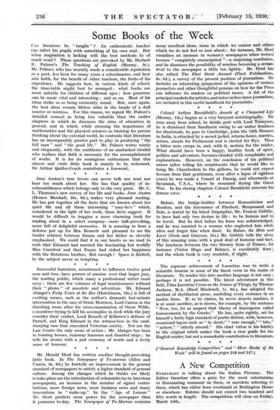The supreme achievement of . Lucretius was to .write a
scientific treatise in some -of the finest verse in the realm of literature. To render this into another.language is not .easy ; perhaps it is not possible. -The latest adventurer in this field, Titus Lucretius Carus on the Nature ofThings, by.Thomas JackSon, M.A. (Basil Blackwell, 7s. 6d.), has . adopted. the method of rhythmical prose, modelling every sentence in an iambic form. If, as he claims, he never deserts iambics, it is at some sacrifice, as is shown, for example, by the sentence " Now, too, let -us suspect- that theory. of Anaxagoras called homoeomeria by the Greeks." He has, quite' rightly, set for himself a fairly high standard of poetic diction,-with, however, occasional lapSes such as " in short," " sure ...enough," " bits," " nohow, " " utterly absurd." . His chief virtue is his fidelity to the original WhiCh makes the book; a -true guide for the Englishreader, but not a remarkable contribution to literature.










































 Previous page
Previous page